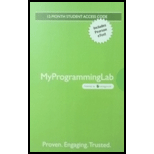
MyLab Programming with Pearson eText -- Standalone Access Card -- for Starting Out With C++: Early Objects (My Programming Lab)
9th Edition
ISBN: 9780134379548
Author: Tony Gaddis, Judy Walters, Godfrey Muganda
Publisher: PEARSON
expand_more
expand_more
format_list_bulleted
Concept explainers
Expert Solution & Answer
Chapter 16.1, Problem 16.4CP
Explanation of Solution
The “try” block:
- The “try” block is starts with the keyword “try” and it contains the code which will have the possibility to generate an exception.
- The “try” block must be followed by one or more “catch” blocks which are denoted as exception handlers.
The “catch” block:
- The “catch” block is starts with the keyword “catch” and it is followed by an “exception parameter”.
- The Catch block contains the code to be executed when the error occurred in Try block.
The general syntax for “try/catch” as follows:
try
{
//code which causes an exception;try block
}
Catch(Exception_argument)
{
//code which handles the exception;catch block
}
//Repeat catch blocks as many as needed
Process of the “try/catch” blocks:
- The “try” block contains a block of statements which may cause an exception to be thrown.
- Once an exception is caught, it has to be thrown to the “catch” block using “throw” statement. After executing the “catch” block, the program resumes at the statement, which follows the “try/catch” blocks.
Example:
For example, consider the below code containing an exception handler for dividing two integers:
#include <iostream>
#include <string>
using namespace std;
//function definition of "divide"
double divide(int a, int b)
{
//The value of "b" is 0
if (b == 0)
{
//declare and define the string
string exception="ERROR: denominator should not be 0...
Expert Solution & Answer
Want to see the full answer?
Check out a sample textbook solution
Students have asked these similar questions
Is there any way to skip Finally block of exception even if some exception occurs in the exception block?
Has a catchphrase been used? What exactly does a finally clause mean? How do catch and finally operate in an exception program?
What is the catch phrase? What is a finally clause? How do both catch and finally work in an exception program?
Chapter 16 Solutions
MyLab Programming with Pearson eText -- Standalone Access Card -- for Starting Out With C++: Early Objects (My Programming Lab)
Ch. 16.1 - Prob. 16.1CPCh. 16.1 - Prob. 16.2CPCh. 16.1 - Prob. 16.3CPCh. 16.1 - Prob. 16.4CPCh. 16.1 - Prob. 16.5CPCh. 16.2 - Prob. 16.6CPCh. 16.2 - The function int minPosition(int arr[ ], int size)...Ch. 16.2 - What must you be sure of when passing a class...Ch. 16.2 - Prob. 16.9CPCh. 16.4 - Prob. 16.10CP
Ch. 16.4 - In the following Rectangle class declaration, the...Ch. 16 - The line containing a throw statement is known as...Ch. 16 - Prob. 2RQECh. 16 - Prob. 3RQECh. 16 - Prob. 4RQECh. 16 - The beginning of a template is marked by a(n)...Ch. 16 - Prob. 6RQECh. 16 - A(n)______ container organizes data in a...Ch. 16 - Prob. 8RQECh. 16 - Prob. 9RQECh. 16 - Prob. 10RQECh. 16 - Write a function template that takes a generic...Ch. 16 - Write a function template that is capable of...Ch. 16 - Describe what will happen if you call the function...Ch. 16 - Prob. 14RQECh. 16 - Each of the following declarations or code...Ch. 16 - Prob. 16RQECh. 16 - String Bound Exceptions Write a class BCheckString...Ch. 16 - Prob. 2PCCh. 16 - Prob. 3PCCh. 16 - Sequence Accumulation Write n function T...Ch. 16 - Rotate Left The two sets of output below show the...Ch. 16 - Template Reversal Write a template function that...Ch. 16 - SimpleVector Modification Modify the SimpleVector...Ch. 16 - Prob. 8PCCh. 16 - Sortabl eVector Class Template Write a class...Ch. 16 - Prob. 10PCCh. 16 - Word Transformers Modification Modify Program...Ch. 16 - Prob. 12PC
Knowledge Booster
Learn more about
Need a deep-dive on the concept behind this application? Look no further. Learn more about this topic, computer-science and related others by exploring similar questions and additional content below.Similar questions
- could you include a try-catch statement that calls the GetYear function defined above. If a BadYear exception is thrown, print an error message and rethrow the exception to a caller; otherwise, execution should just continue as normal.arrow_forwardIf no exceptions are thrown in a try block, where does control proceed to after the try blockcompletes execution?arrow_forwardWhat catch block will catch any type of exception?arrow_forward
- Is there a catchphrase? What is the meaning of a finally clause? In an exception program, how do both catch and finally work?arrow_forwardyour code does not run Exception Handling correctly like shown in my 2nd picture . Can you please fix it ?arrow_forwardWhich of the following statement is true? a. Code in finally block is not executed whether exceptions are thrown or not b. Code in finally block is executed whether exceptions are thrown or not. c. Each try block must have more than one finally block d. Code in finally block is executed only if exceptions are thrown.arrow_forward
- Which of the following statements is false? A software developer can write his own exceptions in Java. A try statement is associated with one and only one catch statement.. A programmer written Exception implements the Exception interface. None of the above statements are falsearrow_forwardCreate a custom exception of unchecked type and write a simple program to display the use of your custom exceptionarrow_forwardWhat outcomes are possible in the event that an exception is thrown outside of a try block?arrow_forward
arrow_back_ios
arrow_forward_ios
Recommended textbooks for you
 C++ Programming: From Problem Analysis to Program...Computer ScienceISBN:9781337102087Author:D. S. MalikPublisher:Cengage Learning
C++ Programming: From Problem Analysis to Program...Computer ScienceISBN:9781337102087Author:D. S. MalikPublisher:Cengage Learning Microsoft Visual C#Computer ScienceISBN:9781337102100Author:Joyce, Farrell.Publisher:Cengage Learning,
Microsoft Visual C#Computer ScienceISBN:9781337102100Author:Joyce, Farrell.Publisher:Cengage Learning,

C++ Programming: From Problem Analysis to Program...
Computer Science
ISBN:9781337102087
Author:D. S. Malik
Publisher:Cengage Learning

Microsoft Visual C#
Computer Science
ISBN:9781337102100
Author:Joyce, Farrell.
Publisher:Cengage Learning,